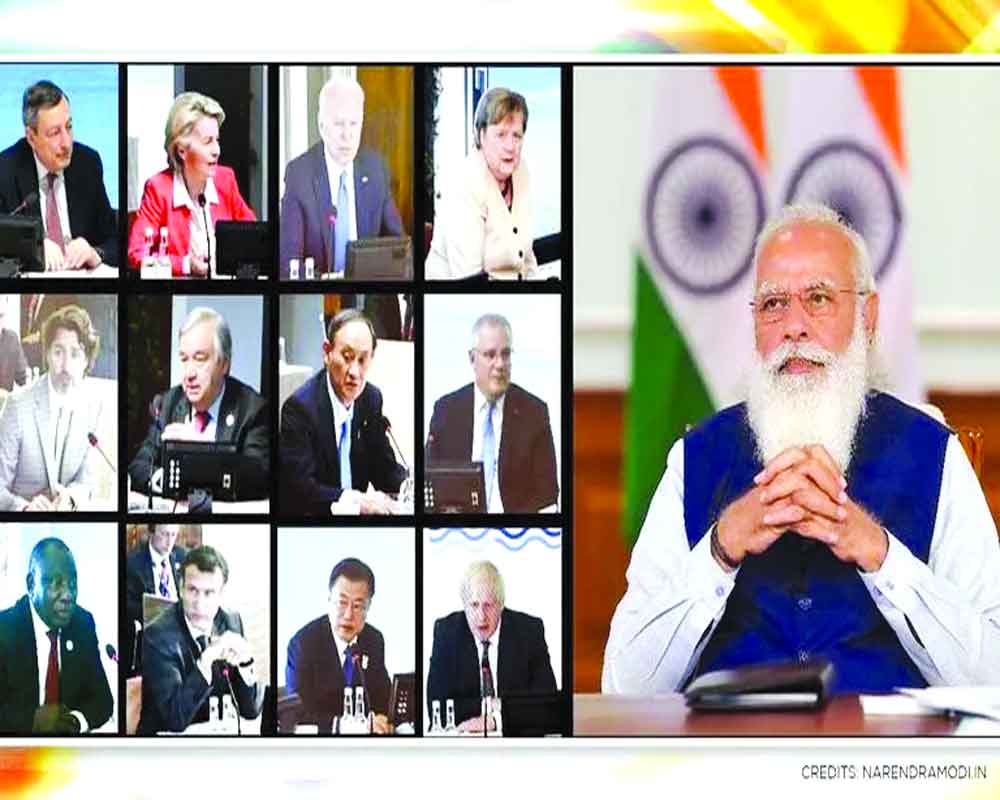It is quite clear that the western nations will make efforts to convince India to change its stance on Russia, which is a delicate diplomatic challenge
The upcoming G7 Summit in Germany will see global leaders get together to discuss several issues. The one that will dominate the deliberations is likely the Ukraine invasion, sanctions on Russia and how the world, the western world, should deal with defiant Russian President Vladimir Putin. Prime Minister Narendra Modi will be there, as India, Indonesia, South Africa and Senegal have been invited as special guests. According to a report in Bloomberg, Germany was in two minds as to whether to extend the invitation to India; the reservation being that India has not condemned Russia for its invasion and also abstained from the United Nations Resolutions censuring Russia. But pragmatism won the day and India was extended the invitation. But it remains quite clear that in the luxury resort of Schloss Elmau in the Bavarian Alps, where the Summit will take place, the western nations will make efforts to convince India to change its stance on Russia.
For India and Modi, it will present a delicate diplomatic challenge. Of course, India today wants to be a part of the global leadership but it has no intentions of breaking ties with old and tested allies, Russia being the best example. The problem also is that not only has India not condemned Russian actions in Ukraine, it continues to buy oil at discounted rates from it and is also working out an alternative payment system to keep this going. The United States and Europe, who have been leading the charge against Russia, have expressed their frustrations but, of late, the approach has been more nuanced in public with the western world trying to show an understanding of India’s position.
Indications are clear that while India will stick to its stand, so will the western world. Earlier this year, while visiting Germany, Modi called on both Russia and Ukraine to end the fighting, saying: “We believe that no party can emerge victorious in this war.†Foreign Secretary Vinay Kwatra also said that India has always maintained that “there should be cessation of hostilities in Ukraine and the path to resolution goes through diplomacy and dialogueâ€. India is likely to toe this line during the G7 Summit. But, behind closed doors, the G7 intends to raise the pressure on India.
So far, one has to admit that India has maintained its ‘neutrality’ on the Ukraine war with success. The Quad, a grouping of the US, Japan, India and Australia which initially seemed to be tested by the Ukraine crisis with three members vocally critiquing Russia and India being the lone neutral voice, seems to have reconciled to the in-house differences. Challenges in the Indo-Pacific are a common cause for Quad and even as the Ukraine war presents a new challenge, reality stares hard in the shape of China. All four need one another to counter the dragon’s ever-expanding global footprint. Also, for India, China is another worrisome factor that explains its stand on Russia. In the regional dynamics, Russia’s embrace of China is worrisome and a closer relationship between Russia and Pakistan even more so. After the Ukraine war, the world has seen a change in the shape of its alliances and a closer Russia-China axis is there for all to see. It doesn’t make the world comfortable but it worries India even more, with a boundary dispute, and the Chinese looking for yet another excuse to expand territorially.
The G7 consists of Canada, France, Germany, Italy, Japan, the United Kingdom and the US (the European Union is not a member of the G7 but attends the Summit). It is an informal grouping of the world’s richest nations and hence the most powerful, too. Russia had joined the G7 in 1998 making it G8 then, but following the annexation of Crimea in 2014, Russia was shown the door. Interestingly, China, despite the size of its economy and the global influence it asserts, has been kept out of the grouping. So looking at the G7 in an unbiased fashion, it’s quite apparent that it is a grouping of rich and powerful western nations that has zero representation from Africa and the Middle East. It also helps explain and understand the contradictions not just in the global order but also the response to the Ukraine war.
India is not part of the G7 or the western world. But with an economy that is growing and a strategic place in the Indo-Pacific, it today cannot be kept out. India is also one of the few countries that have shown the occasional spine to the western nations that still seem to view the world from a very narrow post-World War II perspective. The upcoming G7 Summit will test India not only in how it puts forward its unique global perspective but also check whether India is ready to push back delicately and demand that the world see situations and crisis from a non-western viewpoint. That, at the end of the day, is the hallmark of a global leader.
(The author, a Delhi-based journalist and foreign affairs analyst, holds a Masters in International Relations from the American University in Washington DC. In 2009, her book ‘Piercing the Heart: Untold Stories of 26/11’, was published. The views expressed are personal.)


























